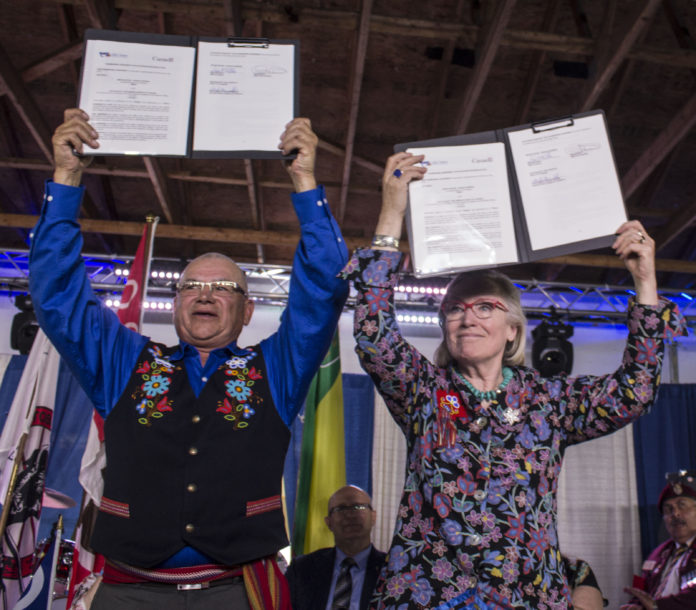
Bianca Bharti, Daily Herald
The federal government and the Métis Nation-Saskatchewan (MN-S) have signed a “historic” framework agreement at Batoche Friday, meant to advance Métis reconciliation and extend Métis self-government and self-determination.
Just a few months earlier, at the end of February, the two parties signed a memorandum of understanding to begin talks on reconciliation.
For years, the Métis have felt sidelined, Glenn McCallum, president of MN-S said. “For the first time in many years, the federal government and ourselves… have come to a point in the Métis Nation where real progress is being made.”
The framework agreement entails a “government-to-government, nation-to-nation,” relationship, where the government of Canada, for the first time, recognizes responsibility for Métis people — not just the provinces and territories.
“The work has been ongoing,” said Minister of Crown-Indigenous Relations Carolyn Bennett. Métis governments have asked for an oversight body and changes in the law that would ensure Métis rights, under section 35 of the constitution, are implemented fairly.
“The legislation that we are working (on) together would also make sure that after we have signed agreements, that Canada is honouring those agreements and implementing them as was the intent when… signed.”
The president of MN-S said it was a “tough road” to getting this agreement with the federal government. The Métis governments, though, trekked on and worked to establish programs and address specific issues rather than sitting idle, he said.
Now, Canada is working on developing amicable relations with Métis governments. “We as Canada often denied the importance of language and culture. We didn’t think it was important that people maintain these connections with their history,” Bennett said. “When people feel proud of who they are, that is their resilience, their self-esteem.”
The agreement was signed at the weekend kickoff of Back to Batoche, an annual festival where Métis from all over the country gather and indulge in cultural festivities. Batoche holds historical significance for the Métis people, as it was one of their first settlements. Many present-day Métis can trace their lineage back to the national historic site.
“To be here at Batoche, to sign this agreement… this is a connection with the ancestors, with the real history of this country,” Bennett said. “And as Métis being a real part of the founding of our country, that is why it’s really important to be here.”
At the opening ceremonies, two other significant documents were signed: a memorandum of understanding between the MN-S and Saskatchewan School Boards Association (SSBA) and a memorandum of understanding between MN-S and the Saskatchewan Health Authority (SHA).
The SSBA and MN-S will work together to ensure the Métis community is represented positively in the school system, both in the curriculum and staff. They will also work to ensure knowledge and history is shared.
The SHA and MN-S will work together on integrated health and recognizing the needs of Métis people, collecting proper data, understanding traditional medicine and providing Métis-specific services.
For Amanda Goller, a Métis woman who sang the Canadian and Métis national anthems, the agreement means so much to her. “It’s a long time coming…. Being Métis is part of who I am.”
To have the working relationship helps bring pride to her heritage, she said as she wiped away a few tears. She spoke about how being Métis was something to be ashamed of not too long ago. Her grandparents wouldn’t talk about their culture and as a result, her mother didn’t even know she was Métis until later in life.
“It wasn’t until I started asking questions, that (my grandparents) accepted it was okay and it wasn’t something to be ashamed of.”
Tom Isaac, a lawyer in Aboriginal law who consulted with the Canadian government on working towards reconciliation, said there are still challenges that need to be addressed, such as improving living standards, education and child welfare.
“The Métis are a key component to understanding the creation of this great country,” Isaac said. “This is historic and it represents a significant starting point for the Métis Nation of Saskatchewan and the government of Canada to begin to resolve many outstanding issues.”

